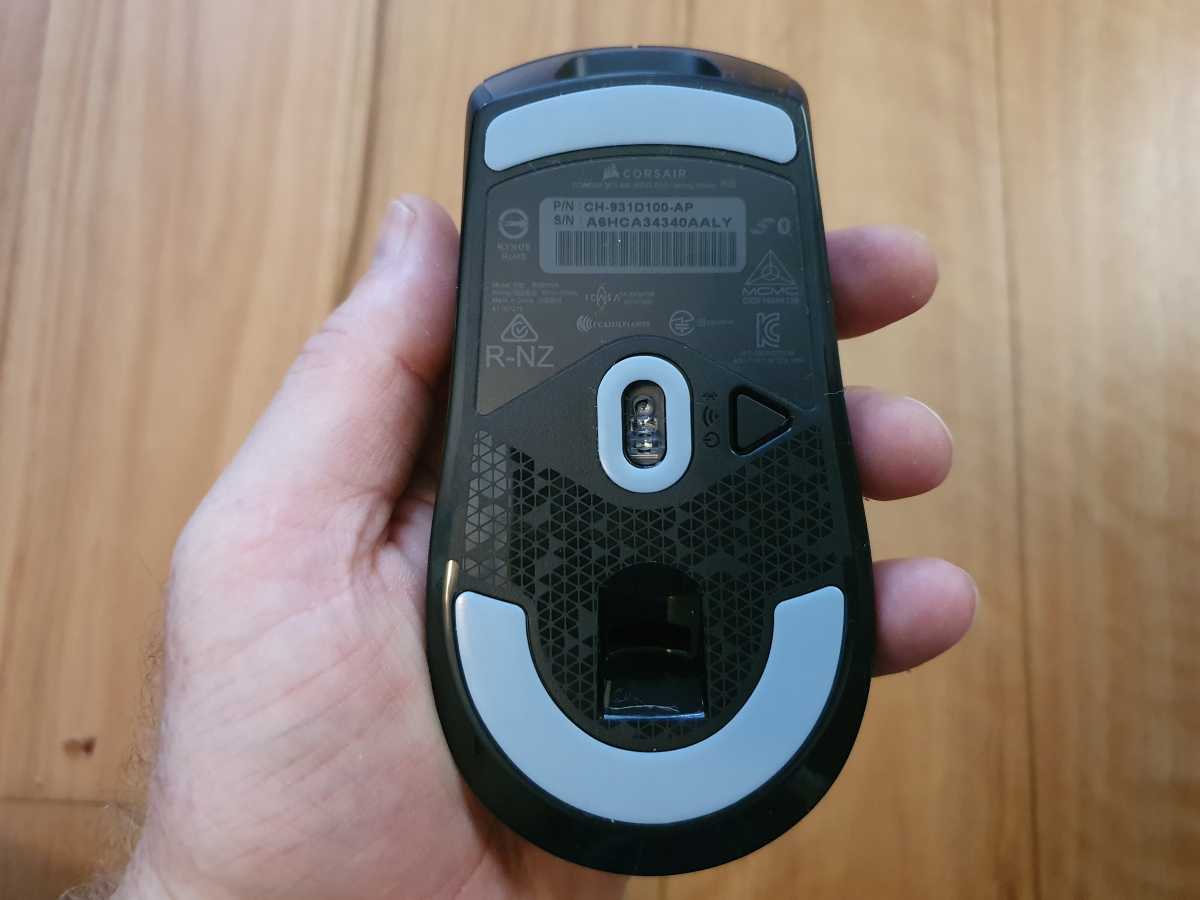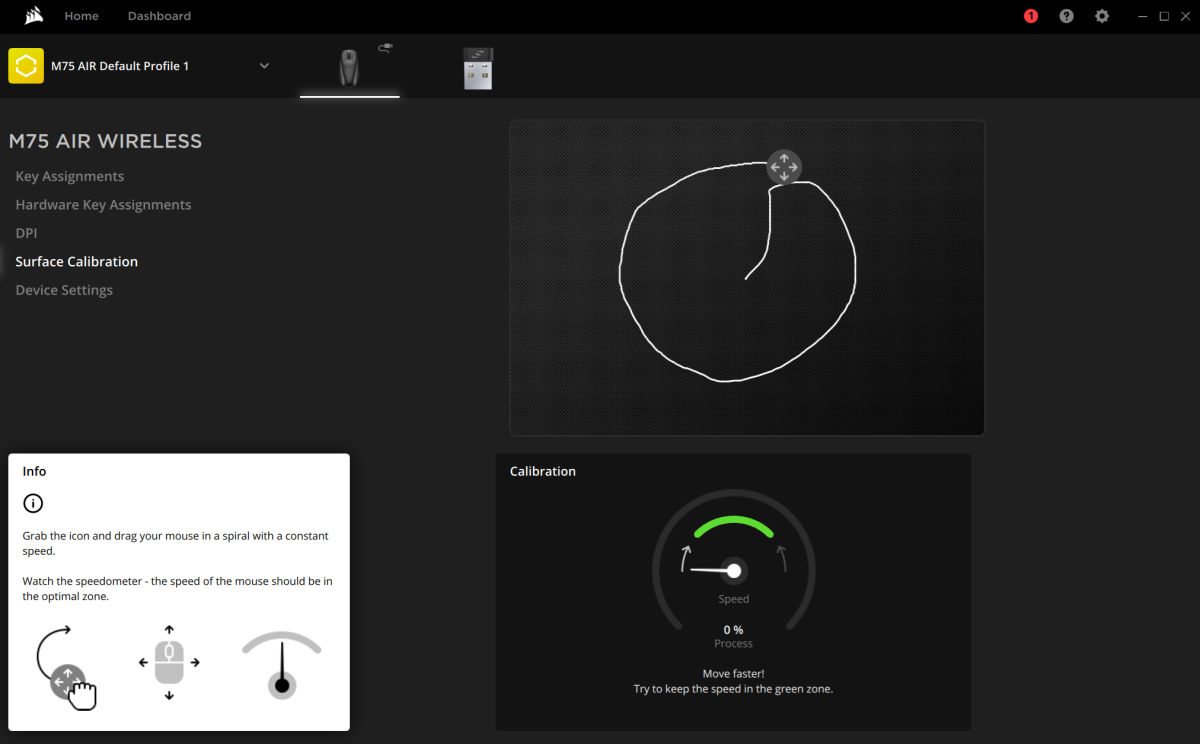Expert’s Rating
Pros
- Its narrow, high-backed design enables superior control
- The 26K Optical sensor is quick and reliable
- Up to a quick 2,000Hz / 0.5ms default polling rate
Cons
- One button for Bluetooth and Wi-Fi can be confusing
- There’s just one onboard memory profile
- No DPI switcher button
Our Verdict
The Corsair M75 Air Wireless is like the peregrine falcon of the gaming mouse world; expertly designed for speed and precision, it’s an absolute killer in fast FPS games where you need that kind of speed the most.
Price When Reviewed
99.99
Best Prices Today: Corsair M75 Air Wireless
$99.99
The $100 Corsair M75 Air Wireless is a lightning-fast mouse that’s precisely tailored for the quickest competitive games. In FPS, Battle Royale, and MOBA games, it more than had my back in closely contested firefights. A good deal of that speed comes from its kickass hardware — its 26K Marksman Optical sensor with up to a 2,000Hz / 0.5 ms default polling rate, for one — but that’s only half of the story…
While other FPS gaming mice depend almost entirely on their hardware for speed, the Corsair M75 Air Wireless draws equally on its symmetrical, tapered design, which you could say is its real secret weapon. Indeed, this mouse is like the peregrine falcon of the gaming mouse world; streamlined, and with just the right amount of weight, it moves across your mouse mat with a smoothness and glide that you’d be hard pressed finding in any competitors.
Further reading: See our roundup of the best wireless gaming mice to learn about competing products.
Corsair M75 Air Wireless: Design and build
Measuring 1.6 x 2.6 x 5 inches, the M75 Air has quite a narrow front and high top when compared to other FPS mice like the Razer Viper V3 HyperSpeed, which has been my go-to gaming steed over the holiday season. But that simply adds a layer of comfort to my play that I didn’t even know I wanted.
Ergo, the M75 Air Wireless feels very supportive in the three major grip types — claw, palm, and fingertip — but it’s especially accurate in a claw and palm grip, since its high-arched back really fills up the palm, making micro movements a little easier to pull off.
It sports quite a few other differences to my V3 HyperSpeed that I really dig too: Unlike the latter, my black review model infuses a touch of yellow in its mouse wheel, which stands out nicely against its unicolor body. I also really like how the M75 Air Wireless’s shell feels slightly grippier than the HyperSpeed’s, which means it moves a little more synchronously with my hand movements.

Horseshoe-shaped PTFE feet ensure the M75 Wireless glides effortlessly across your mouse mat or tabletop.
Dominic Bayley / IDG
Symmetry dominates the M75 Air Wireless’s look and feel overall, however, like a peregrine falcon diving for its prey everything is just so perfectly inline. The main clicks, for example, sit tightly inside the lines of the chassis rather than flaring outwards. Consequently, my fingers sit very closely together. The main clicks are, however, very large and spacious. My long-ish fingers span their whole length, so the M75 Air Wireless is just ideal for large hands.
A distraction-free 5-button configuration
The M75 Air Wireless’s button configuration is a simple, right-handed five-button affair consisting of two main clicks, two side buttons and a single click in the mouse wheel, but there’s no DPI switcher on top — essentially, it’s a no-frills getup that offers no unwanted distractions to play. The side buttons are quite small and flat, and not easy to hit by mistake. That said, they can feel a little too low-key at times.
While ultra-light mice are popping up like gophers in springtime — heck, I’ve even got one made from lightweight nylon at home — some sub-60-gram mice just seem a little too light for my limbic brain to like the feel of. But the M75 Air Wireless’s weight is a good middle ground — at exactly 60-grams, it’s lightweight, but not too lightweight, so it feels quick off the mark without leaving your hand feeling unsatisfyingly empty.
Corsair M75 Air Wireless: Connectivity and battery life
The M75 Air Wireless supports wireless, Bluetooth, and wired connections, and comes with a tiny USB-C dongle and USB-A to USB-C cord in the box. It’s compatible with Windows 10/11 as well as macOS versions 10.15 or later, which is super handy if you use PCs at home and Macs at work, or vice versa.
I mainly used the M75 Air Wireless in 2.4GHz Slipstream Wi-Fi mode on my Windows gaming laptop, where it proved exceptionally quick, boasting a near-zero latency of less than 1 millisecond. The dongle has a handy storage compartment on the underside, which meant I always had a place to put it when I was done gaming.
One gripe I have about connecting, though, is that you have to press the same button on the underside to switch between Wi-Fi and Bluetooth modes, which makes it difficult at times to decipher which mode you’re in. A three-slot switch would have easily fixed this problem, but unfortunately Corsair opted for the former option.
On the upside, the mouse’s battery life is quite decent — the M75 Air Wireless offers up to 34 hours in Wi-Fi mode and up to 100 hours in Bluetooth mode, which means you’ll only need to plug it in after many days of satisfying play.
Speed seems to be written all over this mouse’s underside, metaphorically speaking, thanks to its very well-placed PTFE feet…
How is the Corsair M75 Air Wireless software?
The iCue software app is your go-to app for tweaking the M75 Air Wireless’s settings. Seeing as the mouse has no RGB to speak of, I mainly used it to change performance settings like the DPI and the polling rate. The app has a handy device settings window that displays a roundup of information like your battery status and polling rate all in one place, so you don’t need to flip through multiple submenus.
iCue also lets you create personalized profiles, which I did often since I could only store the one profile in the mouse’s onboard memory. Another handy feature lets you calibrate the M75 Air Wireless to perform at its best on the surface you’re using it on — which could bestow a small, but not to be underestimated, boost to movement in games.

Here I’m using the surface calibration tool in the iCue app to calibrate the M75 Air Wireless to my desktop’s wooden surface.
Dominic Bayley / IDG
How is the Corsair M75 Wireless gaming performance?
The M75 Air Wireless’s Marksman 26K Optical Sensor is a serious piece of hardware that soon won me over with its lightning-quick, precise responses. It tracks movement at 650 inches per second (IPS) and at a maximum acceleration up to 50G.
Pixel perfection seems like an apt description of the sensor’s performance in games like Fortnite and Counter-Strike 2, where I could target a hair’s breadth with nary an iota of lag or smoothing. I’ve already mentioned the M75 Air Wireless’s extreme symmetry, but the in-game benefit of that was that I could hit tiny, far-away targets in large open spaces better than I usually can, thereby slightly improving on my K:D tally.
The Corsair Quickstrike buttons also proved some of the fastest I’ve used, but they’re exceptionally quiet for an FPS mouse… Regardless, it was still very satisfying firing them off rapidly — just without the big thrills I get from louder, clicker, mice. They’re also rated for a long life of 100 million clicks.
I have a confession to make — I’m a switcher. Yes, I do tend to like to switch DPI’s mid game, which I sorely missed while using the M75 Air Wireless. It’s no big deal if you’re an ultra-specialist that uses just the one or two character classes, but if you’re like me and tend to change classes a lot, not having a dedicated DPI button can be a real bummer.
Still, slightly making up for that was just how efficiently the M75 Air Wireless glided over my mouse mat. Speed seems to be written all over this mouse’s underside too, metaphorically speaking, thanks to its very well-placed PTFE feet arranged in a horseshoe configuration.
This made it exceptionally easy to make micro adjustments and quick flicks, again adding to that extreme sense of precision and control I get with the M75 Air Wireless. Indeed, if you’re a stickler for pinpoint accurate targeting like me, it’s hard to think of a mouse that will do that any better than this one.
Should you buy the Corsair M75 Air Wireless?
At $100 the Corsair M75 Air Wireless sits in an interesting price category, in that it’s not cheap but it does undercut FPS mice like the $149.99 Razer DeathAdder V3 Pro at the checkout by a lot. Looking at what you get for that price, and it all looks positive…
You get a mouse with a symmetrical, accuracy-enabling design, and a very powerful 26,000 DPI Optical sensor, that sits in the upper echelon for gaming mouse-sensor performance — plus, it has a not-so-vanilla 2,000Hz / 0.5ms polling rate, which is a nice improvement over the ubiquitous 1,000Hz polling rate I often see in FPS gaming mice.
Additionally, the M75 Air Wireless’s 60-gram weight means it’s still ultra-light, but not ridiculously so. Yes, your brain can register it’s there — but no, you don’t feel like you’re piloting a mere wafer like some sub-60-gram mice do.
To be sure, then, if you can do without the DPI switcher button, this mouse is just what the doctor ordered if you’re feeling like your old gaming mouse is a bit stale and you could do with a dose of extra speed and precision in your gaming getup.



